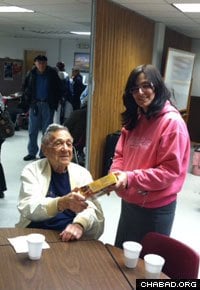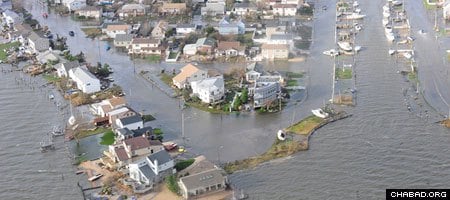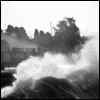Rabbi Avrohom Rapoport is on an island under lockdown. The streets are mostly empty, aside from emergency crews, but the people who are there certainly could use some help, said the director of Chabad-Lubavitch of Atlantic County, who is helping coordinate the local Jewish community’s relief efforts via a Facebook page, email, and when available, the telephone.
He rode through the streets around Atlantic City, N.J., this morning on a construction truck laden with food and water. Debris is everywhere, he reported, with parts of houses, roofs and boardwalk pieces littering the ground. Cars occupy spots on lawns, competing for space with downed telephone wires, while living rooms all across the area sit flooded with water.
Electricity is practically non-existent, but the Chabad House has established a makeshift soup kitchen, while volunteers go door to door to check on those who endured the passage of Hurricane Sandy.
“I think the most important thing for these people is just a smiling face,” explained the rabbi. “One man didn’t speak to anyone in three days. He greeted me with a hug, relieved really just to see someone and talk to someone. That’s what we’re doing here.”
People who did evacuate have flooded the Chabad House with requests to check in on their properties. Meanwhile, Rapoport is putting together a Sabbath dinner for Friday night.
“If we can get people together who are here, to give them a sense of comfort and some good, hot food, that’s our goal for Shabbos,” he said.
Up and down the Eastern Seaboard, from Maryland and Delaware to Connecticut, communities are turning to a host of institutions, from Red Cross shelters to local organizations for help. For many Jewish families, that means area Chabad Houses, which themselves were hit hard by Sandy’s rains and winds. Even in locations miles inland, which were spared the worst of the water, millions remain without power; such was the case in Stamford, Conn., where Chabad-Lubavitch Rabbi Moshe and Leah Shemtov worked to keep a sense of community alive.
In Long Beach, N.Y., Rabbi Eli Goodman said his family is safe, but their apartment is destroyed. The water in the synagogue’s social hall is “head high” said Goodman, director of Chabad of the Beaches and educational director of the local Bach Jewish Center.
Rabbi Yisroel Stone, co-director of Chabad of the Lower East Side in Manhattan, has been without power and water since Monday.
“We’ve been trying to help with necessary rides,” he said, going door to door to supply food and help people depart. The institution was slated to have a young professionals’ sushi evening this Friday, but “I don’t know if that’ll happen, due to power issues and loss of food,” he added.
Meanwhile, in South Brunswick, N.J., the Chabad House postponed its 10th anniversary celebration to focus on relief efforts and help the community rebuild. Instead of an event in the East Brunswick Hilton, staff members will be dropping off kosher food around town to those who need it.
“We did not cancel the order from the caterer; we only changed the packaging,” said one of the program’s organizers.
Last night, volunteers with the Rabbinical College of America-Chabad Headquarters of New Jersey and its new division, Rutgers Jewish Outreach, took to the streets in New Brunswick to hand out kosher meals to students evacuated from their dormitories.

“Hundreds of kosher meals were distributed throughout the night,” said Rabbi Pinchas Super, director of Rutgers Jewish Outreach.
Classes have been cancelled at Rutgers University until next Monday, and most of the city remains powerless.
“Rutgers Jewish Outreach will continue distributing these meals for the coming days, until everything is back to normal,” he said, adding that he’ll be handing out meals during lunch and dinner outside of the two open dining halls and the area’s shelters.
Rabbi Zalman Duchman, who runs Chabad of Roosevelt Island in New York, said in 30 years, he hasn’t seen a storm like this.
“During the storm the wind and water was terrible,” he said. Despite a high sea wall, the water came up onto the island, immersing a walkway around the island, he recalled.
Still, compared to places in New Jersey and other parts of New York, said Duchman, the storm was kind to them.
“The only damage we see, thank G‑d, is property damage. A lot of falling trees,” he said.
As of Monday, the only way on and off the island was by car, but now the tram is open. Subways, however, remain closed.
Yesterday his wife and children went around offering support to elderly residents. And today they had patients from the long-term medical facility on the island over for lunch, preparing fresh tuna patties, rice and salads for them.
“It was the first hot, fresh meal they’d had,” he said. Today his kids are back in school, but elsewhere on the island, “a few patches still don’t have electricity.”
Back in Atlantic County, Rapoport is still assessing the damage and what people might need. The Chabad House set up a relief fund where people can volunteer, donate and try to help the area recover.
“People are going to need a lot of moral and financial support and unity to get through these days, to recover from this,” said Rapoport. “The important thing is to look out for each other, and together, we will overcome.”







Join the Discussion